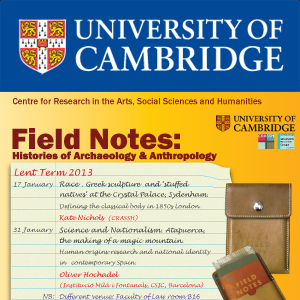Filed Notes - 23 May 2013 - Excavation: Living with the Ancient Romans: Past and Present in Eighteenth-Century Encounters with Herculaneum and Pompeii
Duration: 1 hour 1 min
Share this media item:
Embed this media item:
Embed this media item:
About this item

| Description: |
Charlotte Roberts (Clare College and Faculty of English, University of Cambridge)
Discussant: Dr. Melissa Calaresu (Early Modern History, Gonville & Caius College, Cambridge) Abstract The eighteenth-century ‘discovery’ of the buried cities of Herculaneum and Pompeii revolutionised the way in which individuals thought about their relationship with the ancient world. The accounts of British visitors written between the start of the official excavations in 1738 and the end of the century reflect a new historical sensibility, one predicated upon the extraordinary proximity between present and past that these sites seemed to ensure. This new way of looking at the ancient world challenged many of the established models of classical engagement that dominated European and especially British culture in the late seventeenth and early eighteenth centuries. Herculaneum and Pompeii offered the possibility of an encounter with the ancient world that might not only rival Rome but compensate for some of the shortcomings and disappointments experienced by visitors to that ancient city. This communal, cultural response to the ruins of these cities does not mean, however, that the eighteenth-century influence of Herculaneum and Pompeii was purely decorative, nostalgic or sentimental. Particular voices emerge strongly from the mass of writings inspired by these sites, and the particular closeness between present and past associated with the excavations allows several individuals to shape and develop unique political and intellectual arguments. In this paper I will outline some of the main ideas and images that are characteristic of the eighteenth-century response to the excavation of Herculaneum and Pompeii, but I will also examine the way in which these broad ideas were echoed, altered or appropriated by individual thinkers, such as J.J. Winckelmann and Johann Wolfgang von Goethe, who used them to articulate innovative and expansive points of view. I hope that this discussion will provide an opportunity to reflect on the diversity of the eighteenth-century reception of the ancient world; the scope and influence of early archaeology on disciplines other than antiquarianism, and the relationship between cultural and intellectual history in our own understandings of the past. |
|---|
| Created: | 2013-06-06 12:00 |
|---|---|
| Collection: | Field Notes Seminar |
| Publisher: | University of Cambridge |
| Copyright: | Glenn Jobson |
| Language: | eng (English) |
| Keywords: | CRASSH; Field Notes; |
| Abstract: | Charlotte Roberts (Clare College and Faculty of English, University of Cambridge)
Discussant: Dr. Melissa Calaresu (Early Modern History, Gonville & Caius College, Cambridge) Abstract The eighteenth-century ‘discovery’ of the buried cities of Herculaneum and Pompeii revolutionised the way in which individuals thought about their relationship with the ancient world. The accounts of British visitors written between the start of the official excavations in 1738 and the end of the century reflect a new historical sensibility, one predicated upon the extraordinary proximity between present and past that these sites seemed to ensure. This new way of looking at the ancient world challenged many of the established models of classical engagement that dominated European and especially British culture in the late seventeenth and early eighteenth centuries. Herculaneum and Pompeii offered the possibility of an encounter with the ancient world that might not only rival Rome but compensate for some of the shortcomings and disappointments experienced by visitors to that ancient city. This communal, cultural response to the ruins of these cities does not mean, however, that the eighteenth-century influence of Herculaneum and Pompeii was purely decorative, nostalgic or sentimental. Particular voices emerge strongly from the mass of writings inspired by these sites, and the particular closeness between present and past associated with the excavations allows several individuals to shape and develop unique political and intellectual arguments. In this paper I will outline some of the main ideas and images that are characteristic of the eighteenth-century response to the excavation of Herculaneum and Pompeii, but I will also examine the way in which these broad ideas were echoed, altered or appropriated by individual thinkers, such as J.J. Winckelmann and Johann Wolfgang von Goethe, who used them to articulate innovative and expansive points of view. I hope that this discussion will provide an opportunity to reflect on the diversity of the eighteenth-century reception of the ancient world; the scope and influence of early archaeology on disciplines other than antiquarianism, and the relationship between cultural and intellectual history in our own understandings of the past. |
|---|---|

